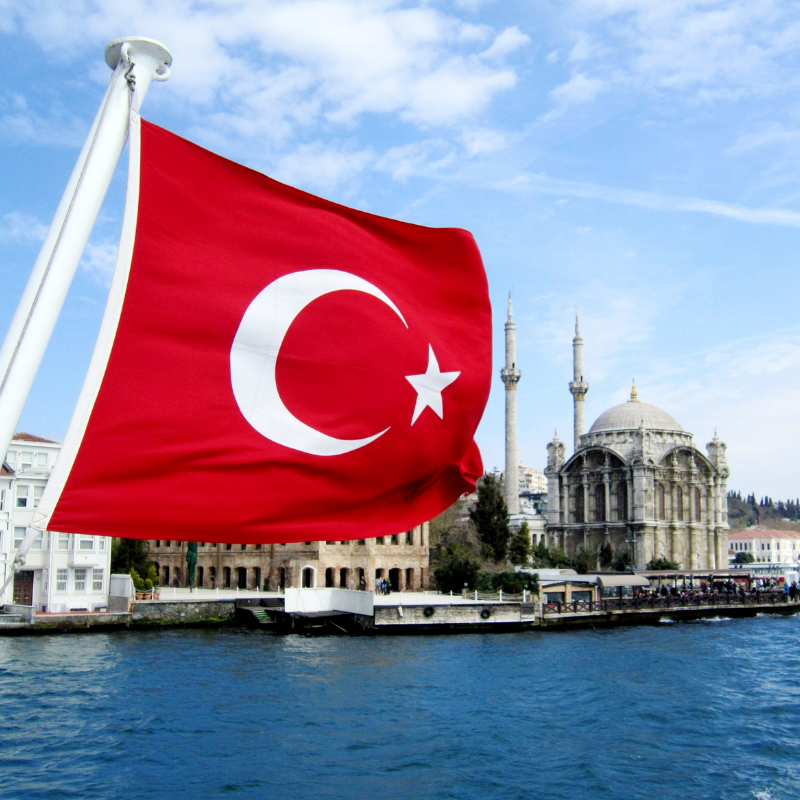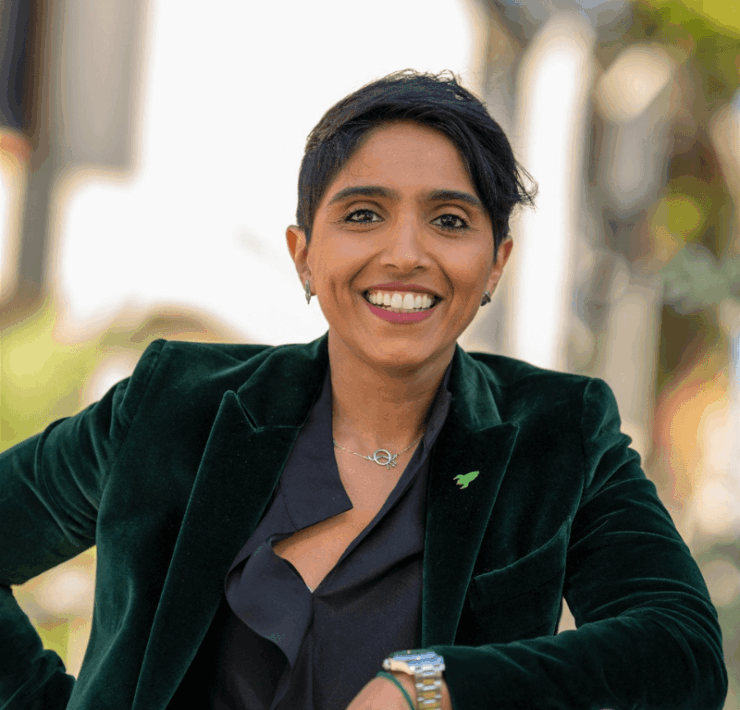“When they appear in court, let’s make them appear in uniform suits like Guantanamo.”
Turkish President Recep Tayyip Erdogan addressed supporters on Friday night, marking a year since a coup attempt failed to topple his regime, leading to a brutal crackdown on opposition voices and a shift towards greater authoritarianism in Turkey. During his speech, Erdogan expressed his gratitude to the Turks who took to the streets in opposition to the coup “who defended their country”, promising to behead the “traitors” who were responsible.
The address was given from a bridge in Istanbul that was captured by rogue military personnel during the failed putsch, which has since been named ‘Martyrs Bridge’ and is now home to a July 15 monument to mark the events. Posters glamorizing the violence of that night decorate the city, while those leaving the country can now relax in the ‘July 15 Heroes of Democracy Lounge’ at the airport and buy July 15 memorial jewellery.
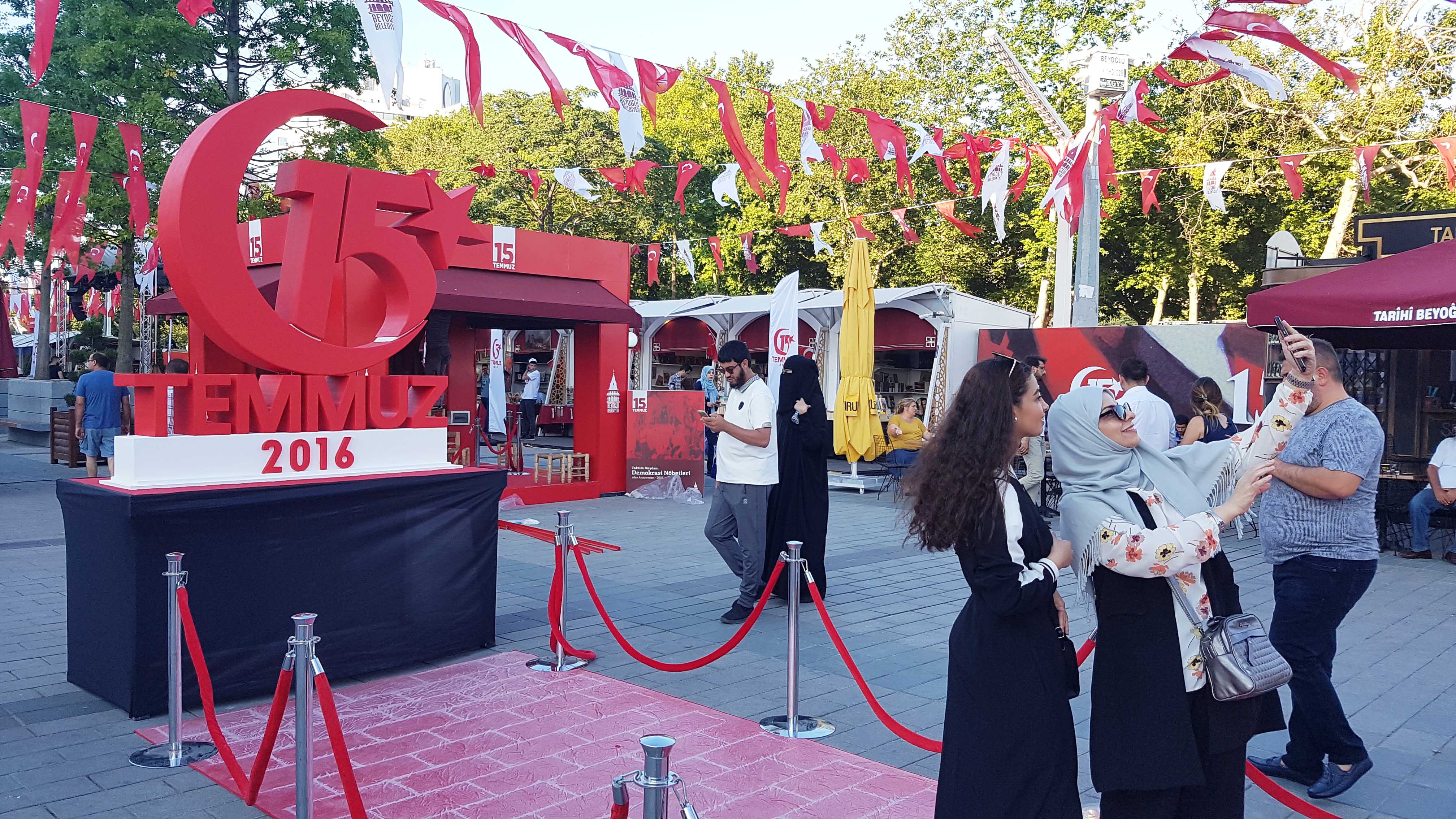 The 15 July Monument in Taqsim Square, Istanbul (image: Public Radio International)
The 15 July Monument in Taqsim Square, Istanbul (image: Public Radio International)
Yet while Erdogan’s government celebrates the coup attempt as a victory for the Turkish Republic, what actually happened that night remains unclear. Since the coup took place, Erdogan has vehemently contended that it was masterminded by US-based preacher and former political opponent Fethullah Gulen, although few seem to share in this conviction. Few details have been revealed about the coup by the government, which has tried to keep a tight grip on information, but what has been leaked is confusing and at times conflicting.
Evidence appears to suggest that Turkish intelligence was aware of the coup attempt before it happened, yet virtually no measures were taken to prevent it from taking place. Many have also argued that the number of military personnel who were removed from their positions in its wake is vastly disproportionate to the number of personnel who could feasibly have been involved. This has led to speculation and conspiracy theories that suggest the government was implicated in the coup, or that the attempt was staged in order to allow the Erdogan regime to stamp out opposition within the military.
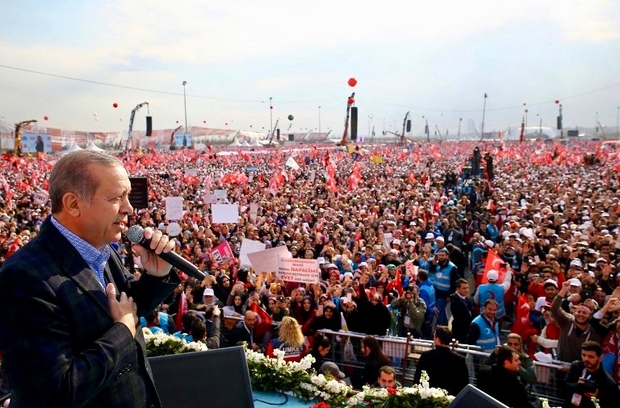 President Erdogan addressed a large rally in Istanbul on Friday marking the anniversary of the failed coup attempt (image: Middle East Eye)
President Erdogan addressed a large rally in Istanbul on Friday marking the anniversary of the failed coup attempt (image: Middle East Eye)
Accusing the government of responsibility for the coup might sound far-fetched. However, it may not be so outrageous to suggest that the government was aware of what was about to happen and let it go ahead. Erdogan’s government has undeniably benefited from the fallout of the coup, which has been used to justify a widespread crackdown in Turkey against political opposition, unfavourable elements within the military, judges, teachers, civil servants, academics, journalists and human rights activists.
Over the year since the coup attempt took place, 50,000 people have been detained and 170,000 investigated for supposed links to the Gulenist “traitor” movement, with little evidence to support such action. But while Erdogan may have succeeded in silencing his opposition, he has also crippled the military’s fighting capabilities and rid Turkey of some of its most intelligent and progressive thinkers.
Perceptions of the crackdown vary wildly in Turkish society, which is deeply divided. On the one hand, the educated, secular-minded middle classes see Erdogan’s tendencies towards authoritarianism and Islamism as a threat to democracy and human rights. On the other, a large, lower income support base to whom Erdogan has brought development and jobs see him as the champion of the working poor.
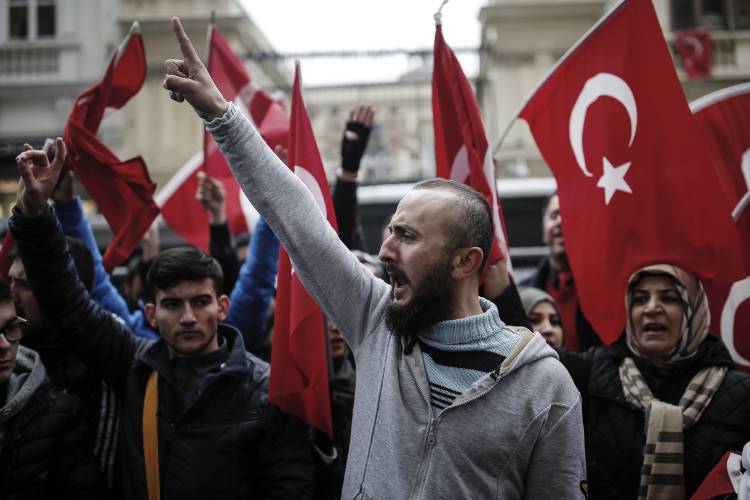 “Mr Erdogan is adored by half the nation and loathed by the other half of the country. Whatever narrative he shapes will be embraced only by one half and rejected completely by the other half.” – Soner Cagaptay, Director of the Turkish Research Program at the Washington Institute (image: VNews)
“Mr Erdogan is adored by half the nation and loathed by the other half of the country. Whatever narrative he shapes will be embraced only by one half and rejected completely by the other half.” – Soner Cagaptay, Director of the Turkish Research Program at the Washington Institute (image: VNews)
These societal divisions came to a head in April of this year when a referendum in the Turkish Republic saw 51.3% of Turks vote to change the country’s parliamentary democracy into a presidential system. The new system vastly expands the President’s powers, potentially allowing him to run for two more terms, which would see him in power until 2029. Erdogan’s campaign for a “yes” vote was heavily influenced by his so-called “victory for the Turkish people” in defeating the “traitors” who plotted to overthrow him last year.
The coup has also impacted Turkish politics on the international stage, increasing tensions between an emboldened Erdogan and his traditional NATO and EU allies. On the European front, relations have soured significantly as a result of a series of disagreements in the wake of the coup. Erdogan saw European powers’ reluctance to point the finger of blame at the Gulenist movement as a lack of support for his government.
 Turks took to the streets of Istanbul on 15 July 2016 in opposition to the coup attempt (image: RT)
Turks took to the streets of Istanbul on 15 July 2016 in opposition to the coup attempt (image: RT)
Tensions were heightened in the run-up to the referendum, when countries like Germany and the Netherlands attempted to prevent government-held rallies for Turks living in their countries. Erdogan responded with cries of “fascism”, calling the Netherlands “a Nazi remnant”. In fact, it seems Ankara has abandoned entirely its bid to join the EU, putting itself at odds with the bloc’s fundamental principles by showing support for the reintroduction of the death penalty. At the anniversary of the coup on Friday, Erdogan boldly announced “if parliament passes a bill on resuming executions in Turkey, I will sign it.”
Meanwhile, to Ankara’s dismay, the US has steadfastly refused demands for the extradition of Fethullah Gulen, the coup’s supposed mastermind who currently resides in Pennsylvania. The two countries have also come into conflict in Syria, where Turkey has taken direct action against Kurdish groups allied with the US in the fight against ISIS in Raqqa.
Russia, on the other hand, has become an unlikely ally for Ankara. Despite the two countries’ opposing views on the future role of the Syrian regime, they have come together at the negotiating table to hold talks between different parties to the conflict. It’s possible that the Erdogan regime sees the Kremlin as a safer bet for upholding its own interests (i.e. continuing the fight against Kurdish autonomy in southern Turkey and in Syria). Could this shift in alliances signal the beginning of a new Eastern bloc?
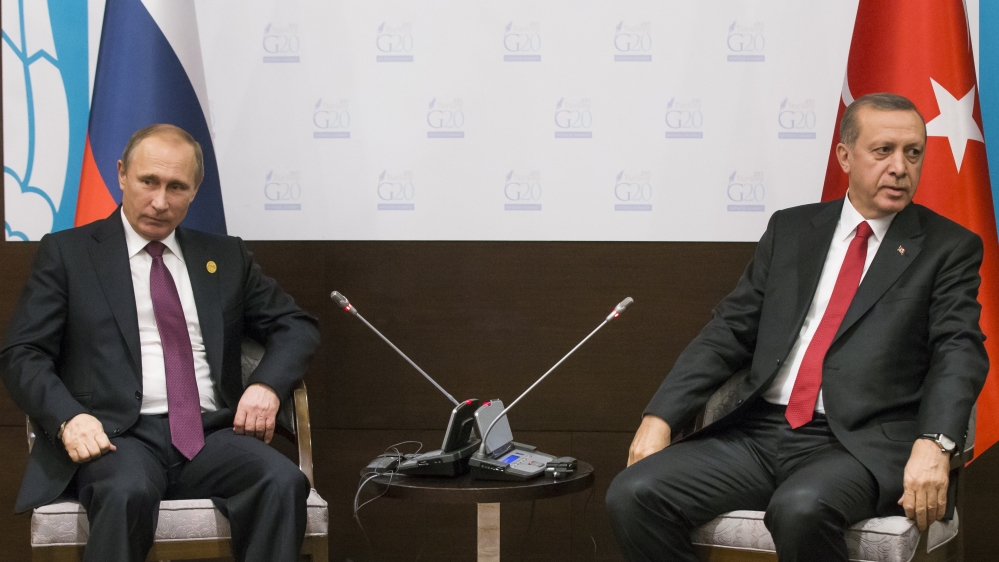 Souring relations with Turkey’s EU and NATO allies have pushed Ankara closer to Russia (image: Al Jazeera)
Souring relations with Turkey’s EU and NATO allies have pushed Ankara closer to Russia (image: Al Jazeera)
Turkey is not new to coups. In fact, the military has successfully intervened in Turkish politics three times since the formation of the Republic by the revered Mustafa Kemal Ataturk in 1923. Turkey’s coups have generally been perceived as successfully bringing the country back from the brink of authoritarianism to the original ideals of democracy and republicanism upon which the state was built.
While the outcome of a successful coup on 15 July 2016 will remain unknown, what is clear is that Turkey is heading down a dangerous path towards a new era of politics, defined by authoritarian tendencies that contradict the very foundations of the Republic. This, coupled with Erdogan’s foreign policy shift, could signal a very different future for Turkey to that which its more progressive citizens and policy makers in the West had envisaged. Only time will tell how far Erdogan will go.
If you found this interesting, you might also like:
Turkey: The new Middle Eastern dictatorship?

